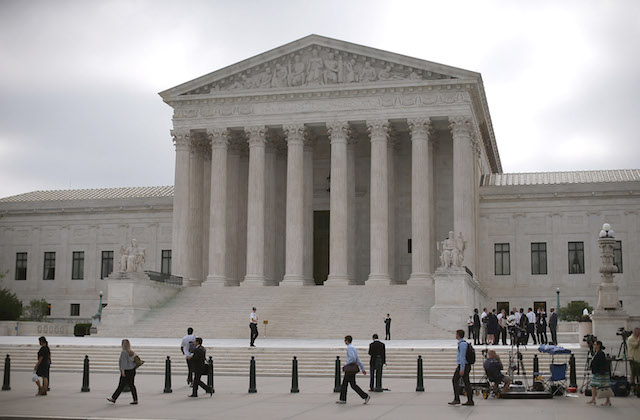READ: Why Overturning Roe v. Wade Is An Assault On More Than Abortion Rights

President Donald Trump is scheduled to announce his nominee for the open seat on the Supreme Court of the United States tonight (July 9), and it is likely that his pick will be in support of overturning Roe v. Wade. The landmark 1973 decision recognized that the constitutional right to privacy means a woman has the right to make her own medical decisions—including whether or not to have an abortion. An opinion piece published in The Washington Post yesterday (July 8) argues that overturning Roe would not only be a blow to women’s reproductive rights, but an assault on everyone living in America.
The piece, titled “Roe Isn’t Just About Women’s Rights. It’s About Everyone’s Personal Liberty.” was written by Nancy Northrup, president and chief executive of the Center for Reproductive Rights. She compares Roe to a “load-bearing element. Knock it down, and the structure falls.” Writes Northrup:
The constitutional framework of Roe is about far more than abortion. It’s about rearing our children without unwarranted government interference. It’s about choosing whom we want to marry. It’s about deciding with whom we want to create a home. It’s about the right to use contraception. It’s about what the Supreme Court in Planned Parenthood v. Casey explained is the “promise of the Constitution that there is a realm of personal liberty which the government may not enter.”
Northrup says that the justices who decided Roe looked to past cases—including 1967’s Loving v. Virginia, which deemed interracial marriage legal between a man and a woman—in making their ruling. And, she says, the line that connected all of these cases implied that “liberty cannot exist if we are not free to make decisions about our lives, bodies and health free from government interference.” She added:
Just as Roe rested on past liberty decisions, it became the basis for future ones—including outside the area of women’s reproductive rights. The court cited Roe and Casey’s reasoning in a broad range of subsequent cases. Those include landmark decisions protecting liberty rights, as in Lawrence v. Texas (2003), which held that the government cannot criminalize intimate sexual conduct between same-sex partners, and Obergefell v. Hodges (2015), guaranteeing same-sex couples the right to marry.
This line of precedent protects us all, and a post-Kennedy Supreme Court could not sever it without threatening to destroy our “realm of personal liberty.”
Overturn Roe, and that protected realm vanishes.
Northrup also lays out the immediate consequences of overturning Roe. As many as 23 states have laws in place that could be triggered to automatically make abortion illegal. This, she writes, “would fall hardest on young and low-income women, women of color and anyone unable to travel out of state to seek access to abortion care that was once available closer to home.”
The reproductive health crisis would extend beyond access to abortions; it would also mean that the government was further positioned to, says Northrup, “exert control over a woman’s body, and invite tyranny over our most intimate and personal life decisions." It is this combination—an assault on reproductive rights and against broader liberties—that would make a reversal of Roe catastrophic:
The Supreme Court can’t just negate a woman’s right to abortion without unraveling protections for all. You can have either the president’s promise about overturning Roe or the Constitution’s promise of a realm of personal liberty. You can’t have both.
